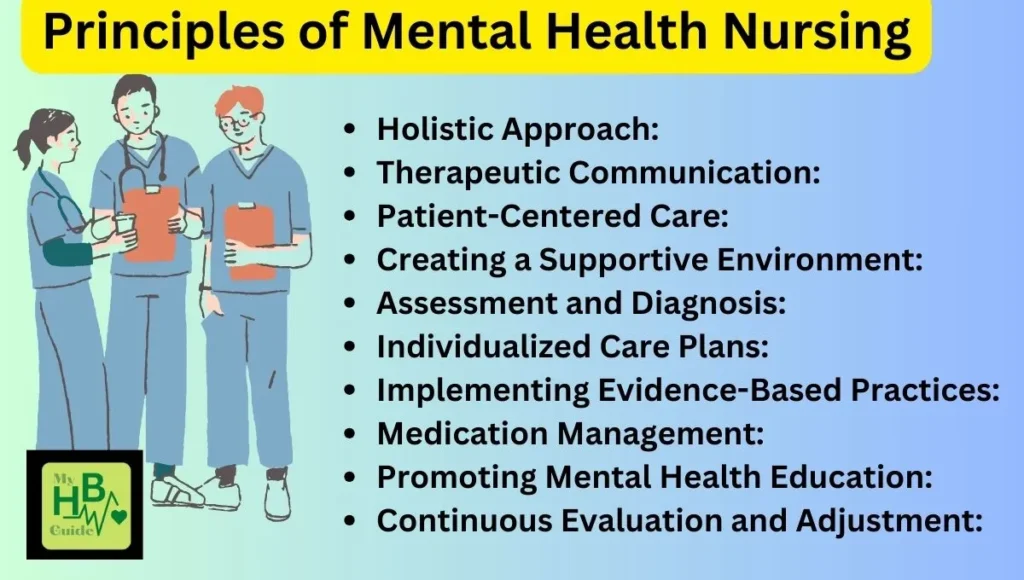Mental health nursing plays a crucial role in providing support and care to individuals facing mental health challenges. In this article, we’ll explore the fundamental principles of mental health nursing, breaking down complex concepts into simple language that everyone can understand.
Understanding the principles of mental health nursing is essential for promoting overall well-being. Whether you’re a healthcare professional, a patient, or someone seeking to support a loved one, grasping these principles can foster a more compassionate and effective approach to mental health.

Understanding Mental Health Nursing
Definition and Scope
Mental health nursing involves caring for individuals experiencing mental health disorders. It encompasses a broad range of conditions and requires specialized knowledge and skills.
Role of Mental Health Nurses
Mental health nurses play a pivotal role in the care team, providing emotional support, administering treatments, and promoting a patient-centered approach to healing.
Key Principles of Mental Health Nursing
Holistic Approach
Mental health nursing goes beyond addressing symptoms; it embraces a holistic approach that considers the physical, emotional, and social aspects of an individual’s life.
Therapeutic Communication
Effective communication is at the core of mental health nursing, fostering trust and understanding between the nurse and the patient.
Patient-Centered Care
Tailoring care plans to the unique needs of each patient ensures a more personalized and effective approach to treatment.
Creating a Supportive Environment
Physical and Emotional Safety
Establishing a safe environment, both physically and emotionally, is crucial for the well-being of individuals facing mental health challenges.
Building Trust
Building a trusting relationship between the mental health nurse and the patient is key to successful collaboration and positive outcomes.

Assessment and Diagnosis in Mental Health Nursing
Comprehensive Patient Assessment
Thoroughly assessing a patient’s mental health status allows for a more accurate diagnosis and targeted interventions.
Collaborative Diagnosis
Involving the patient in the diagnostic process ensures a collaborative approach, empowering individuals to take an active role in their mental health care.
Developing Individualized Care Plans
Tailoring Care to Patients’ Needs
Recognizing the uniqueness of each individual’s experience guides the creation of care plans that address specific mental health concerns.
Involving Patients in Decision-Making
Empowering patients to actively participate in decision-making fosters a sense of control and autonomy in their mental health journey.
Implementing Evidence-Based Practices
Using Research to Inform Nursing Interventions
Staying informed about the latest research ensures that mental health nurses implement evidence-based practices for optimal patient outcomes.
Staying Updated on Best Practices
Continuous education and professional development are essential to staying current with the evolving field of mental health nursing.
Medication Management and Monitoring
Administering Medications Safely
Proper medication management is crucial, and mental health nurses are trained to administer medications safely and monitor their effects.
Regular Patient Monitoring
Continuous monitoring of patients ensures timely adjustments to medication plans, promoting overall treatment effectiveness.
Promoting Mental Health Education
Empowering Patients with Knowledge
Providing education about mental health conditions helps reduce stigma and empowers patients to actively participate in their recovery.
Reducing Stigma
Addressing misconceptions and stereotypes surrounding mental health contributes to a more supportive and inclusive community.
Handling Crisis Situations
Crisis Intervention Strategies
Mental health nurses are equipped with strategies to manage crisis situations, ensuring the safety and well-being of patients.
Collaborative Crisis Management
Collaborating with other healthcare professionals in crisis situations enhances the effectiveness of interventions.
Collaboration with Multidisciplinary Teams
Working with Psychologists, Social Workers, and Psychiatrists
Collaboration with a diverse team of professionals ensures comprehensive care, addressing various aspects of mental health.
Coordinated Patient Care
A coordinated approach to patient care ensures seamless transitions between different healthcare professionals, promoting holistic well-being.
Continuous Evaluation and Adjustment
Regularly Assessing Care Effectiveness
Ongoing evaluation of the effectiveness of mental health care allows for adjustments to be made to the treatment plan as needed.
Making Adjustments as Needed
Flexibility in the approach to care ensures that interventions are tailored to the evolving needs of the individual.
Technology in Mental Health Nursing
Incorporating Digital Tools for Patient Support
Utilizing technology enhances patient support, allowing for remote monitoring and virtual interventions.
Telehealth in Mental Health
Telehealth services contribute to increased accessibility to mental health care, especially in remote or underserved areas.
Ensuring Confidentiality and Privacy
Legal and Ethical Considerations
Maintaining confidentiality and privacy is a priority, guided by legal and ethical standards.
Safeguarding Patient Information
Implementing secure practices ensures the protection of sensitive patient information, fostering trust in the healthcare system.
How To Remove Trapped Gas In Chest 10 Quick And Natural Remedies
Conclusion
Understanding the principles of mental health nursing is crucial for fostering a supportive and inclusive approach to mental health care. By embracing a holistic perspective, promoting effective communication, and collaborating with multidisciplinary teams, mental health nurses play a vital role in the well-being of individuals facing mental health challenges.
How can mental health nurses promote a supportive environment for patients?
Mental health nurses achieve this by establishing both physical and emotional safety, building trust, and creating personalized care plans.
What role does technology play in mental health nursing?
Technology is used to incorporate digital tools for patient support, including telehealth services for increased accessibility.
How do mental health nurses handle crisis situations?
Mental health nurses are trained in crisis intervention strategies and collaborate with other professionals for effective crisis management.
Why is patient education essential in mental health nursing?
Patient education reduces stigma, empowers individuals in their mental health journey, and promotes active participation in recovery.
How do mental health nurses ensure confidentiality and privacy?
Mental health nurses follow legal and ethical considerations, implementing secure practices to safeguard patient information.
